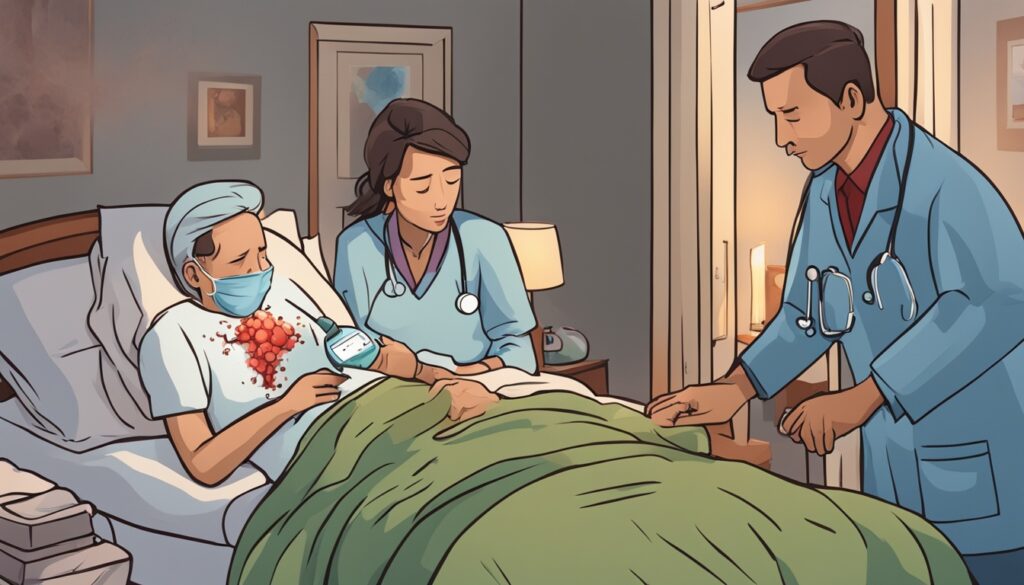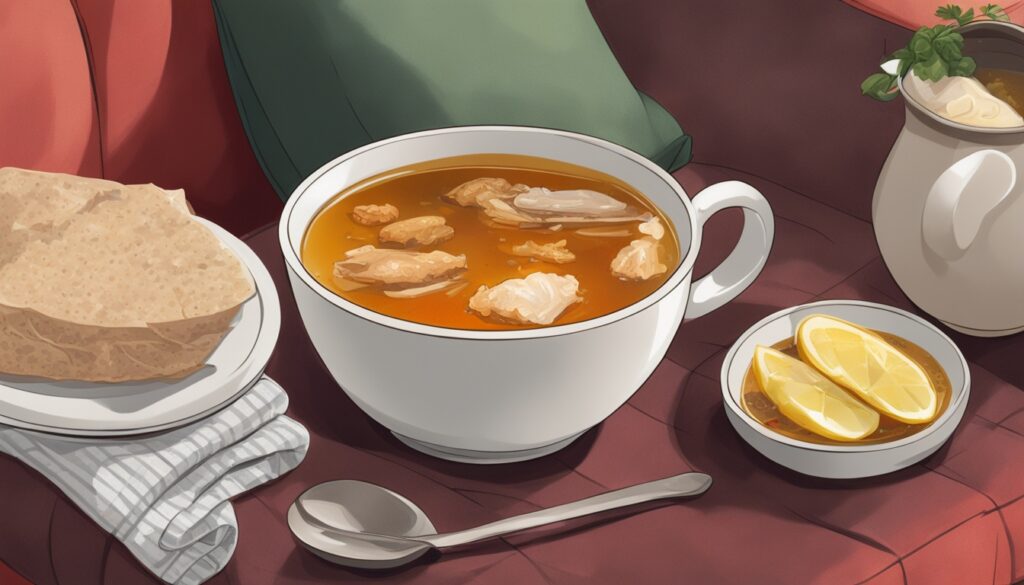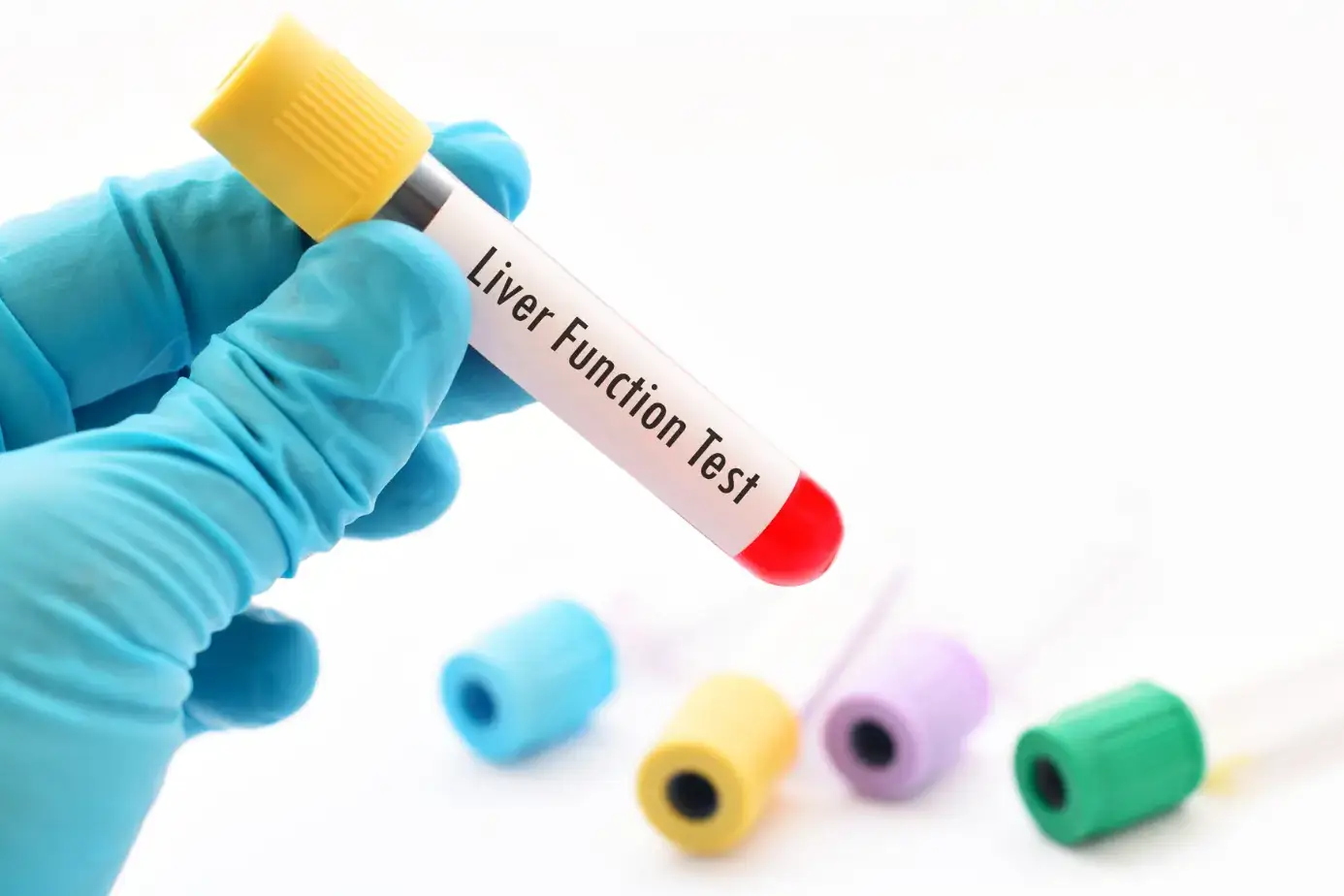Stomach flu is a nasty bug that spreads easily and makes your stomach hurt. It leads to symptoms like diarrhea, cramps, fever, and throwing up. Having the stomach flu can be tough, but most people get better in a few days. It’s important to treat it right away to feel better and keep dehydration away. This article looks at how you can take care of yourself at home and when to get help from a doctor. Knowing the best ways to deal with stomach flu can help you get over it more quickly and stop it from spreading.
Table of Contents
ToggleWhat is Stomach Flu?
Understanding Viral Gastroenteritis
Viral gastroenteritis, often called the “stomach flu,” spreads easily. It’s caused by several viruses that attack the gut. This illness is not the same as the flu caused by influenza.
Norovirus, rotavirus, adenovirus, and astrovirus are the top reasons for the stomach flu.
Common Causes and Symptoms
If you catch the stomach flu, you might get diarrhea, feel your stomach ache, or want to throw up. Fever might also happen sometimes. These issues show up about 12 to 48 hours after you get the virus. They usually last 1 to 3 days, but they could stick around for up to 10 days.
Viruses like norovirus and rotavirus are often behind the stomach flu.
Diagnosis of Stomach Flu
Feeling sick with the stomach flu is tough. It’s key to see a doctor for the right diagnosis. Doctors use your symptoms, check you during a physical exam, and consider any similar cases in your area.
Physical Examination
Your doctor will check for signs of dehydration when you’re sick. Things like a dry mouth, less elastic skin, and fast heart rates tell them how sick you might be. This helps decide if you need extra care.
Stool Testing for Pathogens
Doctors might ask for a stool sample to find out what’s making you sick. Some viruses like rotavirus and norovirus cause most of these illnesses. A fast stool test can show if these are the cause. But, not all viruses can be found this quickly.
Symptoms, the physical check-up, and sometimes stool tests come together. This helps your doctor figure out what’s causing your stomach flu. They then plan how to heal you best and fastest.

Stomach Flu Treatment Options
In most cases, the stomach flu goes away by itself. You usually don’t need to see a doctor. The goal is to manage symptoms and avoid dehydration. Doing some things at home and using over-the-counter drugs can help a lot.
Self-Care Measures
Keeping yourself hydrated is key during the stomach flu. Drink water, broth, or drinks like sports drinks to replace what you’ve lost. Also, eat plain, easy-to-digest foods. The BRAT diet, which includes bananas, rice, applesauce, and toast, can be good for you.
Over-the-Counter Medications
Over-the-counter drugs can ease certain stomach flu symptoms, like diarrhea. Loperamide (Imodium) is one such drug. It slows down gut movement and lessens diarrhea. But, be careful with this drug, especially with kids, and don’t use it if you see blood in stool or have a fever.
Bismuth subsalicylate (Pepto-Bismol) is another helpful drug. It fights diarrhea, nausea, and stomach pain by lessening inflammation and fluid production. Still, always be cautious, especially when using over-the-counter drugs with children or if you have certain health issues.

Over-the-counter drugs are good for symptom relief but won’t make the stomach flu go away faster. Remember to stay hydrated and keep an eye on your symptoms. If things don’t get better or they get worse, see a doctor.
Staying Hydrated During Stomach Flu
It’s key to stay hydrated when you have the stomach flu. Vomiting and diarrhea cause a lot of fluid and electrolyte loss. This can lead to dehydration, which can be dangerous, especially for younger people and those with weak immune systems. For adults, it’s important to drink fluids like water, fruit juices, sports drinks, and broths.
Importance of Fluid Replacement
Your body’s main part is water, about 60 to 65 percent. Normally, you lose some of this water during the stomach flu. To avoid dehydration’s serious problems, staying hydrated is a must. Children have even more water in their bodies, around 70 to 75 percent. This makes them more at risk of dehydration when they get the stomach flu.
Oral Rehydration Solutions
Oral rehydration solutions are drinks like Pedialyte and CeraLyte. They are made to replace lost fluids and electrolytes effectively. They are great for infants and children with the stomach flu. These drinks have the right amount of sugar and salts to help fight dehydration.
If you’re an older adult, these solutions can help you recover from the stomach flu, too. This is because older adults are often at a higher risk of dehydration. These drinks are a safe and effective way to rehydrate.

Dietary Considerations for Stomach Flu
When you have the stomach flu, you probably won’t feel like eating much. But eating a bit, starting with gentle foods, is important. The BRAT diet is a great pick. This diet includes bananas, rice, applesauce, and toast. These foods are easy on the stomach and can make your stools firmer.
Other good choices are clear broths, oatmeal, and saltine crackers. They’re light and can also help you feel better.
The BRAT Diet
If you’re feeling under the weather with tummy problems, try the BRAT diet. It’s easy to remember because it stands for bananas, rice, applesauce, and toast. These foods are mild and can aid in solidifying your stool. They slowly ease you into eating again during your healing phase.
Foods to Avoid
While recovering from the stomach flu, it’s key to pick your foods wisely. Stay away from fried, fatty, dairy, spicy, and raw foods. Also, skip on the sugary or caffeinated drinks. Eating or drinking these things can upset your stomach more and delay your recovery. Go for plain, easy-to-digest meals instead.

After you start feeling a bit better, slowly bring back a mix of carbs, proteins, and good fats. This will slowly help you gain strength and get over the stomach flu.
Rest and Sleep for Recovery
Getting enough rest and sleep is crucial for overcoming the stomach flu. This illness can make you feel very weak and tired. It’s vital to pay attention to your body and rest a lot.
Good sleep helps your body fight the virus and lower inflammation. This, in turn, reduces your symptoms. Try to sleep 7-9 hours every night. And take naps during the day if you feel tired. This approach supports your recovery from the stomach flu.

Avoiding poor sleep is key during the stomach flu. Try hard to get the right amount of rest. The worst flu symptoms usually last two to three days.
By focusing on rest and sleep, you’ll recover quicker. Giving your body time to heal is very important. This is how you can better manage the impact of the stomach flu on your body.
Medications for Symptom Relief
The stomach flu usually goes away on its own. But over-the-counter medicines can help with symptoms. Loperamide (Imodium) can slow down your gut and lessen diarrhea. Use it carefully, though. Stop if you see blood in your poop or have a fever.
Loperamide (Imodium) for Diarrhea
Bismuth subsalicylate (Pepto-Bismol) fights diarrhea, upset stomach, and nausea. It works by reducing swelling and blocking fluid loss in the gut. Just be mindful when using these drugs. Children and anyone sick or old should check with a doctor first.
Bismuth Subsalicylate (Pepto-Bismol)
When dealing with the stomach flu, over-the-counter medicines for stomach flu can ease symptoms. But remember, always use them with care. And getting advice from a health pro is important, especially for kids and those more at risk.
Probiotics for Stomach Flu Treatment
Some studies suggest that probiotics can help with the stomach flu’s bad symptoms. For example, probiotics such as Bifidobacterium infantis and Lactobacillus rhamnosus might lower the severity of diarrhea.
Potential Benefits of Probiotics
Research shows certain probiotics could lessen how long and how bad diarrhea gets. They work by bringing back the good bacteria in our stomachs. This process helps our bodies fight off the stomach flu virus. Still, scientists are studying how well probiotics truly work against the stomach flu.
Safety Considerations
Remember, the FDA doesn’t check probiotic supplements like they do with medicines. If you want to try a new probiotic, talk to your doctor first. This is extra important if the person is a child or has a weak immune system. Your doctor can tell you what kinds and how much probiotics are safe.
Complementary and Alternative Remedies
Aside from standard treatments, some natural remedies might help with certain stomach flu symptoms. Acupressure, from traditional Chinese medicine, is known for possibly easing nausea and vomiting. A recent study from 2022 showed that pressing certain points on the wrist with a special wristband lessened these symptoms for pregnant women with intense morning sickness. While we need more studies, acupressure seems to be a safe, natural method for fighting flu-related nausea.
Stomach Flu Causes and Prevention
The stomach flu is mostly caused by viruses, with norovirus being the main one. Other viruses like rotavirus, adenovirus, and astrovirus can also cause it. These viruses spread through direct contact with infected stool or vomit. They can also spread through contaminated food, drinks, or surfaces.
Common Viral Causes
Noroviruses are the top cause of foodborne illness worldwide. On the other hand, rotavirus is the main cause of viral gastroenteritis in kids. Even without symptoms, adults with rotavirus can spread the disease. This is a big worry in places like nursing homes and daycares.
Preventing Transmission
Good hygiene is key to stopping the stomach flu’s spread. This means regular handwashing after using the bathroom, changing diapers, and before eating. It also involves disinfecting surfaces with a bleach solution and safe food handling.
Avoid close contact with those who are infected. Use your own items like towels, utensils, and glasses to reduce the risk. Wash potentially contaminated laundry in hot water. Wear gloves if you handle these items.
For babies and young children, getting a rotavirus vaccine is a good idea. Some countries, like the United States, offer vaccines against viral gastroenteritis.
When to Seek Medical Attention
The stomach flu often goes away by itself in a few days. But, sometimes, it’s vital to get medical help. This is especially true if dehydration might occur, like in kids, the elderly, or those with weak immune systems.
Signs of Dehydration
Be alert for signs like dizziness, fast heart rate, and less urine. Noticing these means you should see a doctor fast. This stops any health problems from getting worse.
Severe or Persistent Symptoms
Feeling very sick for a long time is a sign to see a healthcare provider. Symptoms like bloody diarrhea or big fever need medical attention. They could point to a deeper health issue that needs looking into.
Getting help quickly can prevent bigger problems. It also means you’ll get the right care to beat the flu faster.
Stomach Flu Treatment for Infants and Children
Infants and kids with stomach flu need special care to avoid dehydration. For babies, breastfeeding helps a lot. It gives them needed fluids and boosts their immune system. If a baby drinks formula, stick with it. But you might also need to give them Pedialyte to keep their electrolytes in check.
Oral Rehydration Solutions for Children
Kids who are a bit older need to sip on liquids often. Things like plain water, broth, or even sports drinks can be good. It’s especially important to use oral rehydration solutions if they have lots of diarrhea or throw up a ton. This stops them from getting dehydrated.
Hold off on solid foods until your child feels like eating again. Later, start with easy-to-digest things and work up to their regular foods. This helps their stomach get back to normal.
Breastfeeding and Formula Feeding
After a baby vomits, it’s best to wait 15-20 minutes before offering them liquid. For bottle-fed babies, that means breast milk or special solutions. Once the baby’s better hydrated, they can slowly go back to their normal diet. This includes easy foods like toast and yogurt.
Remember, rest is key for getting better from the stomach flu. It’s important. Knowing how to treat the stomach flu in kids can help them get over it fast. This way, they avoid getting too weak or tired.
Conclusion
The stomach flu, or viral gastroenteritis, is both common and very contagious. It leads to unpleasant symptoms like diarrhea, nausea, vomiting, and stomach cramps. It usually goes away on its own within a few days. But, getting the right treatment is important.
To feel better faster and avoid problems like dehydration, you should drink a lot of fluids. Also, eat foods that are easy on your stomach. Resting is key, too. Sometimes, doctors may recommend over-the-counter medicines or probiotics.
If you’re very dehydrated or have serious symptoms, it’s a good idea to see a doctor. This is especially true for babies, young children, and older folks. By knowing your options for care, you can recover quickly and stop the stomach flu from spreading.
Although it’s a common and usually mild sickness, getting the right care matters. Focus on drinking enough water, take time to rest, and see a doctor if you need help. This way, you can manage the stomach flu and feel better soon.
FAQ
What is the stomach flu?
The stomach flu is also called viral gastroenteritis. It is highly contagious. This illness causes diarrhea, cramps, fever, nausea, and vomiting.
What are the common causes of the stomach flu?
Norovirus, rotavirus, adenovirus, and astrovirus are the most common causes.
How is the stomach flu diagnosed?
Doctors use symptoms and a physical exam to diagnose it. They may also look for similar cases. A rapid stool test can find rotavirus or norovirus.
What are the self-care measures for treating the stomach flu?
For the stomach flu, self-care means staying hydrated. You can sip water, broth, or electrolyte drinks. Eat foods from the BRAT diet like bananas, rice, applesauce, and toast.
Can over-the-counter medications help with the stomach flu?
Yes, medicines like loperamide (Imodium) and Pepto-Bismol can ease symptoms. Use them carefully, especially with children.
Why is staying hydrated important during the stomach flu?
It’s vital to stay hydrated because you lose a lot of fluid. Vomiting and diarrhea are hard on your body, especially for kids and older adults.
What is the BRAT diet, and why is it recommended for the stomach flu?
The BRAT diet includes bananas, rice, applesauce, and toast. It’s good for the stomach flu because these foods are gentle and help with diarrhea.
How important is rest and sleep for recovering from the stomach flu?
Rest and sleep are key to getting better. They help your body fight the virus and reduce tiredness. Sleep also lowers inflammation.
Can probiotics help with the stomach flu?
Probiotics might reduce symptoms and the sickness time. But, more study is needed to be sure they work.
What are some complementary and alternative remedies for the stomach flu?
Acupressure is being looked at for its use in decreasing stomach flu symptoms. But, more proof is needed.
How can the stomach flu be prevented?
To stop the stomach flu from spreading, wash your hands a lot. Clean things you touch often. Make sure food is prepared safely. Giving infants and kids the rotavirus vaccine can also help keep them safe.
When should you seek medical attention for the stomach flu?
Get help from a doctor if you get dehydrated or have bad symptoms. This includes bloody diarrhea, a high fever, or severe stomach pain. Watch for strange behavior, especially in kids or older people.
How is the stomach flu treated in infants and children?
The treatment for young children and babies is like adult care. It focuses on staying hydrated and preventing dehydration. Breastfeeding and using oral rehydration solutions are key for infants and kids with bad diarrhea or vomiting.
About The Author

Medically reviewed by Dr. Nivedita Pandey, MD, DM (Gastroenterology)
Senior Gastroenterologist & Hepatologist
Dr. Nivedita Pandey is a U.S.-trained gastroenterologist and hepatologist with extensive experience in diagnosing and treating liver diseases and gastrointestinal disorders. She specializes in liver enzyme abnormalities, fatty liver disease, hepatitis, cirrhosis, and digestive health.
All content is reviewed for medical accuracy and aligned with current clinical guidelines.
About Author | Instagram | Linkedin





